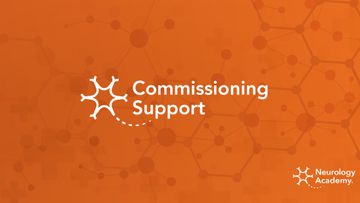Integrated care priorities: meeting them in neurology
NewsNHS England published a letter to the Integrated Care Boards earlier this month, with six priorities to focus on in preparation for the challenges that winter often brings to our health service.
The 'collective core objectives' for 'operational resilience' are primarily aimed at preventative support, reduction of pressure on hospitals, and care closer to home, keeping people well for longer, and out of hospital wherever possible. This includes preventative care through vaccination programmes, better use of services across community and primary care, improved access to and resilience within service directories and operator services, and improved support to people in their home setting when unwell.
Implementing small changes in a service may help meet a number of the objectives synonymously: including supporting care within the home, improving utilisation of urgent community response and rapid response services, reducing A&E overcrowding, and reducing hospital occupancy.
The ideas below are from various delegate projects, presentations and reports across the past year or so - for more ideas, have a look at our projects section, events reports, or our on-demand webinars.
- Better bladder management, such as through home UTI testing kits and bladder clinics, to reduce emergency attendance due to urinary tract infections and subsequent complications and enable treatment at home.
UTIs may cause seizure in epilepsy, relapse in MS, delirium or psychosis in Parkinson's and dementia, and can exacerbate symptoms.
They are a leading cause of unplanned admissions for a number of neurological conditions.
- Falls prevention in people with Parkinson's from improving bone density and optimising medication, to reducing incidence of secondary falls
and a summary of why this matters from a recent Parkinson's Cutting Edge conference.
- Reviewing and improving relapse management, to enable people to be managed and supported at home where possible and
Using an MS relapse pathway via the OPTIMUM care pathway
Improving communication around relapse management in emergency care
Developing multidisciplinary relapse clinics or other models of care and support.
- Single points of contact often reduce unplanned admissions:
A named point of contact can reduce emergency admission and enable responsive and planned care closer to home - whether a specialist nurse, coordinator or other healthcare professional.
Optimisation of care in epilepsy begins with a named point of contact (OPTIMUM care pathway).
A single point of contact is included in the NICE quality standard for Parkinson's
- Use of a consistent integrated care pathway across primary, secondary and community services like the OPTIMUM care pathway for MS, or for epilepsy, or an integrated care pathway for Parkinson's like the one in Norfolk.
The six objectives for ICSs also highlight the '100-day challenge' issued in July this year, around improving hospital discharge across the country. This includes the importance of multidisciplinary engagement, discharge planning and effective transfer of care.
Integration in all its forms, including collaborative working across teams, formalised multidisciplinary working and improved communication across acute care and neurology teams as well as in-reach liaison services like this one for Parkinson'smay all improve acute care, discharge, and follow-up support in the community.
| The 10 best practice initiatives outlined to improve acute hospital discharge are: |
|---|
| 1. Identify patients needing complex discharge support early1. |
| 2. Ensure multidisciplinary engagement in early discharge plan |
| 3. Set expected date of discharge (EDD), and discharge within 48 hours of admission |
| 4. Ensuring consistency of process, personnel and documentation in ward rounds |
| 5. Apply seven-day working to enable discharge of patients during weekends |
| 6. Treat delayed discharge as potential harm event |
| 7. 7. Streamline operation of transfer of care hubs |
| 8. Develop demand/capacity modelling for local and community systems |
| 9. Manage workforce capacity in community and social care settings to better match predicted patterns in demand for care and any surges |
| 10. Revise intermediate care strategies to optimise recovery and rehabilitation |
| The core objectives and key actions for operational resilience outlined are: |
|---|
| 1. Prepare for variants of COVID-19 and respiratory challenges, including an integrated COVID-19 and flu vaccination programmes |
| 2. Increase capacity outside acute trusts, including the scaling up of additional roles in primary care and releasing annual funding to support mental health through the winter. |
| 3. Increase resilience in NHS 111 and 999 services, through increasing the number of call handlers to 4.8k in 111 and 2.5k in 999. |
| 4. Target Category 2 response times and ambulance handover delays, including improved utilisation of urgent community response and rapid response services, the new digital intelligent routing platform, and direct support to the most challenged trusts. |
| 5. Reduce crowding in A&E departments and target the longest waits in ED, through improving use of the NHS directory of services, and increasing provision of same day emergency care and acute frailty services. |
| 6. Reduce hospital occupancy, through increasing capacity by the equivalent of at least 7,000 general and acute beds, through a mix of new physical beds, virtual wards, and improvements elsewhere in the pathway. |
| 7. Ensure timely discharge, across acute, mental health, and community settings, by working with social care partners and implementing the 10 best practice interventions through the ‘100 day challenge’. |
| 8. Provide better support for people at home, including the scaling up of virtual wards and additional support for High Intensity Users with complex needs. |
Related articles
An integral part of transformation
Unique to our other Academies, this runs as a theme of support through all of Neurology Academy. An essential part of service transformation is to engage with, and educate at a management and commissioning level. From national and local pathway design, to data intelligence and optimising data interpretation to improve services, the Commissioning Support Academy equips everyone in our neurology community with the tools they need to transform services and change lives.

